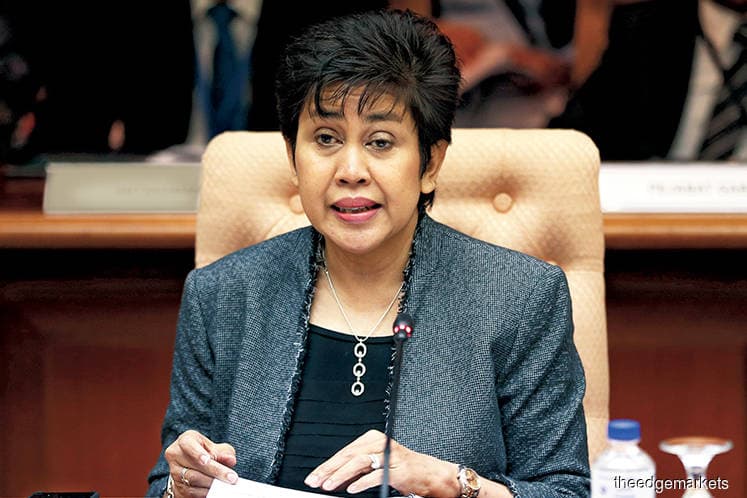
This article first appeared in The Edge Financial Daily on February 14, 2019
KUALA LUMPUR: Bank Negara Malaysia (BNM) governor Datuk Nor Shamsiah Mohd Yunus is expected to unveil the gross domestic product (GDP) growth numbers for the fourth quarter 2018 and the full year today.
The consensus view is that the annual growth pace will come between 4.1% and 5%, according to a Reuters poll.
Nor Shamsiah, who has been in the position for nearly eight months since July last year, will be meeting the press this morning, and here are probably the five questions from the floor for the governor.
1. Is the world on the brink of a recession?
The doomsayers are increasing in number recently. They are not talking about a slowdown in economic growth, they are anticipating a recession on the horizon, the reasons being including escalating US-Sino trade tensions, the monetary tightening in the US although the US Federal Reserve has indicated a potential pause in its interest rate hike, as well as geopolitical risks.
Meanwhile, International Monetary Fund (IMF) managing director Christine Lagarde last Sunday warned governments to gear up for a “possible economic storm”. The IMF has downgraded its forecast for the world’s GDP growth to 3.5%, from 3.7%, and retained Malaysia’s GDP growth at 4.7% for 2018.
The World Bank expects an even slower global growth of 2.9% in 2019, noting the soft international trade and manufacturing activity, elevated trade tensions and financial market pressures faced by some large emerging markets.
Slower growth seems to be a foregone conclusion now. Given the current economic uncertainties, does it warrant recession fears, governor?
2. Is Malaysia on strong grounds to weather the storm?
Bluntly put, there have been sufficient domestic economic issues that kept Malaysians worrying about, for instance the RM1 trillion national debts, the likely widening fiscal gap, the soft property market and the stubbornly high household debts.
Against such a backdrop, this raises concerns whether Malaysia will have anything to fall back on to stimulate domestic economic growth, should the global economy enter into the downcycle.
True enough, no individual economy would be able to escape the global downturn unscathed. Still the public would like to hear from the governor whether the country is on solid footing to withstand any external economic shock. Also, Malaysians would want to know what monetary policy tool the central bank has in hand to at least cushion the adverse impact of a slowdown, knowing that the monetary policy goes hand-in-hand with the fiscal policies.
3. What are the immediate issues that the Economic Action Council should look into?
To address the economic issues faced by the public, the Prime Minister’s Office (PMO), had on Monday, announced the establishment of the Economic Action Council (EAC), which comprises 16 members including Prime Minister Tun Dr Mahathir Mohamad as chairman.
Undoubtedly the council is made up with some of the most well-versed and competent people with different sets of expertise. Being the governor, Nor Shamsiah is expected to know the country’s economy and challenges it is facing like the back of her hand. Malaysians would want to know the central bank’s, an independent statutory body, assessment of the domestic economy. And the measures that BNM could propose to the EAC.
4. Is Bank Pembangunan Malaysia Bhd (BPMB) doing fine?
BPMB has been in the spotlight due to its lax lending and dubious loans. The Edge Malaysia weekly reported that some of the notable ones are, whereby, it being a Malaysian Development Financial Institution (DFI) had extended financing to Integrated Nautical Resort Sdn Bhd and Garuda Suci Sdn Bhd — two companies linked to Indonesian businessman Tan Sri Peter Sondakh — which built and operate the St Regis Langkawi and Langkawi International Convention Centre.
According to BPMB’s 2017 annual report, its board met 27 times; the Risk Management Committee, 29 times; the Credit Committee, 28 times; the Nomination and Remuneration Committee, 24 times; and the Audit and Examination Committee, 16 times; which works out to a total of 124 meetings a year.
To put things in perspective, BPMB pays the chairman a RM15,000 fee per month while directors are remunerated RM5,000 a month. The chairmen of the Credit Committee, Group Nomination and Remuneration Committee, Audit and Examination Committee and Risk Management Committee get RM5,000 per meeting while the members receive RM3,000.
In financial year 2017 (FY17), its gross impaired loans stood at 12.15%, which means the DFI is writing off 12.15 sen for every ringgit it has lent out.
At the end of last year, at the Dewan Negara, it is worth nothing that the government had announced that it has no plans to reorganise or restructure DFIs, recognising their significance in supporting strategic industries.
Perhaps BNM could help shed some light on the well-being of BPMB.
5. What is Bank Negara’s current stance on the cap on foreign ownership in insurance companies?
The foreign ownership limit for Malaysian insurers was set at 70% in 2009 under the financial liberalisation policy. Higher foreign shareholdings were accorded on a case-by-case basis.
Under the previous governor, Tan Sri Muhammad Ibrahim, the central bank had set a June 30, 2018, deadline for all foreign insurers to comply.
It is now way past the deadline, but the central bank has yet to set a new deadline for foreign owners.
Meanwhile, Nor Shamsiah has noted that foreign insurers will be given the option to divest their stakes in their Malaysian units or contribute to the B40 National Health Protection Fund, to comply with a BNM ruling to sell at least 30% of their stakes to local parties.
What would be the consequences that foreign insurers will have to face should they fail to comply with the ruling?